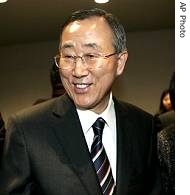-
(单词翻译:双击或拖选)
By Peter Heinlein
United Nations
14 December 2006
South Korea's Ban Ki-moon has been sworn in as U.N. secretary-general, and though he has yet to assume his position he is already vowing1 to restore trust in the world body battered2 by scandals and disputes among member states. VOA's correspondent at the U.N. Peter Heinlein reports Mr. Ban served notice that he intends to be an active voice on world affairs.
 |
| Ban Ki-moon |
"My first priority will be to restore trust," said Ban Ki-moon. "I will seek to act as a harmonizer and bridge-builder."
Speaking to reporters after the oath taking, Mr. Ban said he hopes his mission to restore trust does not turn out to be "Mission Impossible."
He also answered questions on a variety of pressing global and regional issues, revealing that he is already actively6 engaged on pressing issues.
He said the deteriorating7 situation in the Middle East would be among his top priorities, with emphasis on the Israeli-Palestinian conflict.
He warned Iran's leaders that their Holocaust8 denial and calls for Israel's elimination9 are "unacceptable."
"Denying historical facts, especially on such an important subject as the Holocaust is not acceptable," he said. "Nor is it acceptable to call for the elimination of any state or people. I would like to see this fundamental principle respected in rhetoric10 and practice by all the members of international community."
He had similarly strong words to describe the tragedy in Darfur, and suggested he would continue Secretary-General Annan's attempt to work with Sudan's leaders to reverse what he called "deteriorating" security conditions in Darfur.
"Secretary-General Kofi Annan has done a great effort to talk directly to President Bashir of Sudan and other leaders of the African Union," said Ban Ki-moon. "The suffering of the people of Darfur is simply unacceptable. Despite intensive efforts, the security appears to be deteriorating over recent days."
Mr. Ban's most difficult moment came when a reporter asked him to test out his command of French, a language he only recently learned.
By tradition, the U.N. leader must be able to have a working knowledge of French, and Mr. Ban has been studying hard since declaring his candidacy for the job nearly a year ago. But after stumbling with his first few French words, Mr. Ban gave up, and switched to an English/French mix.
"Je n'ai pas pu' [I wasn't able to follow all of your question] duplication of language, if you could speak lentement en francais [if you could speak more slowly in French, I will do my best, but it is very hard for me]."
Mr. Ban is said to be planning sweeping11 changes in the vast U.N. bureaucracy in his first few months in office, and staffers had earlier suggested he might make his first appointments immediately after his swearing in ceremony.
But he told reporters Thursday he is not ready to announce names. He said only that he will almost certainly choose a woman to be deputy secretary general. She will be in charge of what is expected to be a renewed push for reform of the vast U.N. bureaucracy.
 收听单词发音
收听单词发音
1
vowing

|
|
| 起誓,发誓(vow的现在分词形式) | |
参考例句: |
|
|
|
2
battered

|
|
| adj.磨损的;v.连续猛击;磨损 | |
参考例句: |
|
|
|
3
inaugural

|
|
| adj.就职的;n.就职典礼 | |
参考例句: |
|
|
|
4
diplomat

|
|
| n.外交官,外交家;能交际的人,圆滑的人 | |
参考例句: |
|
|
|
5
spoke

|
|
| n.(车轮的)辐条;轮辐;破坏某人的计划;阻挠某人的行动 v.讲,谈(speak的过去式);说;演说;从某种观点来说 | |
参考例句: |
|
|
|
6
actively

|
|
| adv.积极地,勤奋地 | |
参考例句: |
|
|
|
7
deteriorating

|
|
| 恶化,变坏( deteriorate的现在分词 ) | |
参考例句: |
|
|
|
8
holocaust

|
|
| n.大破坏;大屠杀 | |
参考例句: |
|
|
|
9
elimination

|
|
| n.排除,消除,消灭 | |
参考例句: |
|
|
|
10
rhetoric

|
|
| n.修辞学,浮夸之言语 | |
参考例句: |
|
|
|
11
sweeping

|
|
| adj.范围广大的,一扫无遗的 | |
参考例句: |
|
|
|















